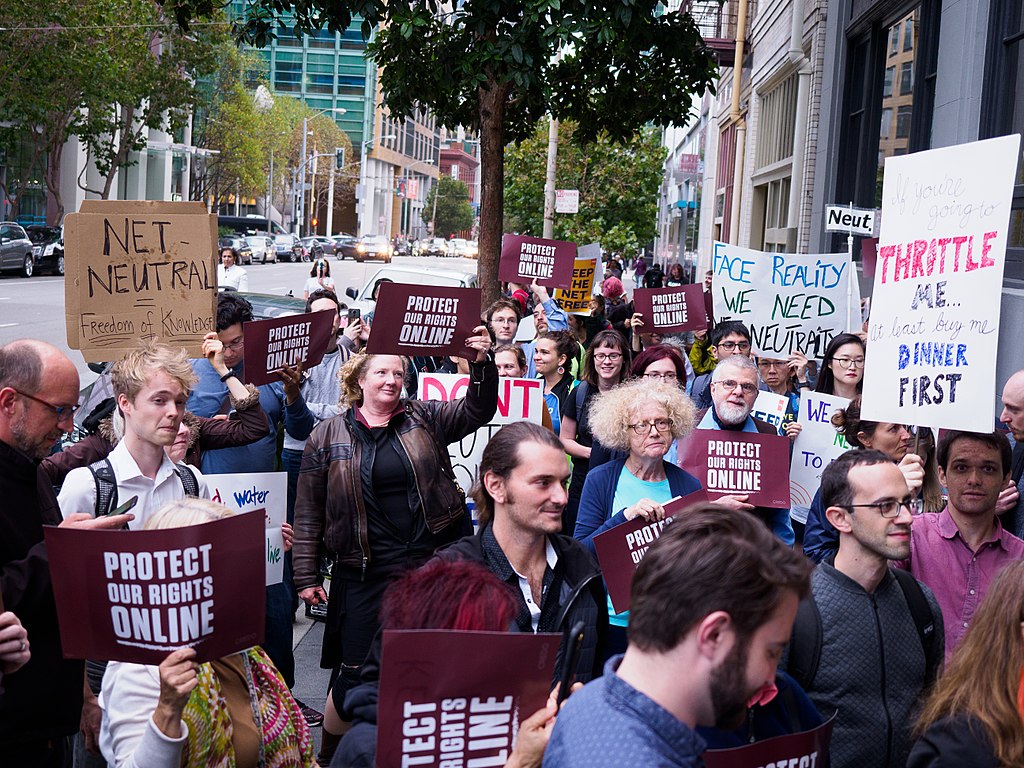Net Neutrality: What it Means for Who

Protect Net Neutrality rally, San Francisco, Photo by Credo Action via Wikimedia Commons / CC 2.0
On November 13 the Republican FCC Chairman Ajit Pai announced a vote to overturn the 2015 Net Neutrality laws. Overturning the decision to keep Net Neutrality laws will allow Internet Service Providers to charge content providers more money to have their material delivered at faster speeds.
Mr. Pai said the 2015 ruling to keep Net Neutrality was a federal “micromanaging” of the internet. Currently the government’s regulation ensures each ISP offer the same internet content at the same speed and quality of broadcast, regardless of financial capability. Proponents of the vote argue the government’s involvement is a hindrance to the free market. The government currently ensures that each ISP provides a platform for all content providers at the same speed and quality of broadcast. The new proposal would require transparency from each ISP. Companies like Comcast and Time Warner would be required to disclose to the public what the content creating companies are being charged. Under the discharging of Net Neutrality, Comcast could charge Netflix higher prices to be provided at the same speed that Comcast runs companies like Hulu and Youtube. Such negotiations would become legal as long as ISPs disclose this information.
Mignon Clyburn, a democrat on the Federal Communications Committee, said the regulations imposed in 2015 are the “best way to protect” internet users and further innovation. Advocates of the current rules argue that the government should not allow discrimination among chosing content providers. They maintain that doing so will ensure equal access to information and content for internet users of all socioeconomic backgrounds. Under the current regulations, proponents argue that anyone with access to the internet can enable any content they desire regardless of their salaries.Those who side with Mignon propose that without Net Neutrality, ISPs can unfairly charge customers or content creators more money to have content played at a reasonable speed. Further, advocates argue that ISPs can purposely slow down the stream time of the content to discourage use of certain companies.
Advocates of the vote argue that the government’s imposition of regulations on the distribution of content impedes market driven competition. The former Verizon lawyer Ajit Pai said that the 2015 regulations stifle small business and low income growth with digital opportunity. Overturning the vote will allow a small radio station in Kansas city the opportunity to have a large enough online presence to compete with the local newspaper as said by Trish Regan from Fox News in an interview with Pai. Many who oppose the current regulations do not believe the government should determine which companies benefit and instead believe the market should ultimately drive the competition. The Chairman says “companies will have more incentive to invest, entrepreneurs will have a better chance to reach more Americans, and consumers….will have faster better and cheaper internet access” ridding the Net Neutrality laws.
Those who refute the necessity of the vote later this week argue Net Neutrality ensures more equality than a market driven solution ever can. LA Weekly wrote that like Black and Latinx communities are more reliant on internet access they have on their cell phones than on a broadband service at home by the Pew Research Center. The possibility of an increase in the price for internet access due to unregulated competition could potentially hurt the lowest income earners of America who are predominately minorities. To many who favor net neutrality, the internet levels the playing field of knowledge for those who cannot afford to go to school. Without net neutrality, education would potentially be tilted in favor of the upper middle class, pushing those who cannot afford higher prices behind. The new regulations could potentially support only those who can afford hikes in prices, or those who have the privilege to risk low regulations. Proponents maintain that the dismissal of Net Neutrality regulations could stratify the population based on economic and social class, and thus create a monopoly over the content of those who cannot afford “more internet.” While the overturning could introduce the possibility of new innovations, those backing Net Neutrality argue that the risk of ridding current equal access for the possibility of innovation in some sectors is ultimately not worth taking.




